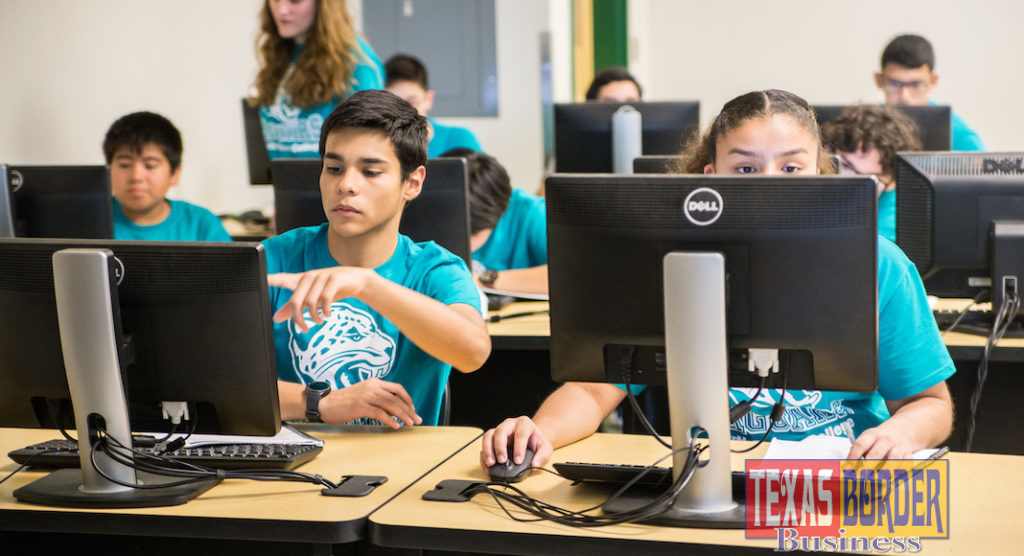
Texas Border Business
MCALLEN, TX – Viruses that corrupt software. Ransomware that holds data hostage. Foreign adversaries that hack into private and public accounts.
Our reliance on computers has spawned many new fields in digital technology. And the challenge of protecting those computers and the data they transmit falls on experts in cybersecurity.
“Because these issues are in the news, everyone is aware that the security of our computer networks and data is vital,” says Francisco Salinas, chairman of the cybersecurity program at South Texas College. “Most private industry is required to have a security expert on the premises, and the need for people highly-trained in cybersecurity will continue to go up.”
Now, flush with $500,923 in grant money from the Carl D. Perkins Reserve, one of the college’s classrooms is being converted into a state-of-the-art cybersecurity lab.
The Perkins Reserve Fund was established with the purpose of promoting proven career and technical education programs. The goal is to prepare students to enter high-skill, high-wage, in-demand positions. South Texas College is the recipient of the monies through a partnership with the Pharr-San Juan-Alamo Independent School District and Texas Workforce, which received a $700,000 total grant.
The partnership will allow students in the district to take two classes in cybersecurity while in high school, thus earning a cybersecurity specialist certificate. Students who then transition to South Texas College to complete the 32-credit program will graduate with an NSA-certified associate’s degree in cybersecurity. They can also choose to continue on, earning a bachelor’s degree in applied technology in computer and information technology, one of four bachelor degree programs available at the College.
Going Where the Jobs Are
The grant represents a solid partnership between the College, area high schools, and industry. South Texas College has worked to broaden these opportunities over the years, always with an eye toward preparing students for in-demand jobs. So have area high schools.
“Our superintendent has been pushing for cybersecurity programs to grow,” says Moses Garcia, cybersecurity teacher at Thomas Jefferson high school within the PSJA school district. “If we can get the attention of these students in high school, we can give them a head start on their careers.” The students most likely to be accepted into – and excel in – this program are those who are interested in coding, technology, and networking, he says.
Students like Aaron Pompa are typical of those who thrive in the program. “I’ve always had a love for computers, and I like that this field is more hands-on than programming. Before I enrolled, I was taking computers apart and putting them back together, researching how they could be improved, how the CPUs could be used to better manage data,” the high school senior says.
“Systems go down and data is held for ransom in part because employees are not trained properly. They open emails they shouldn’t, or they download illegal content that could contain spyware. I’d like to be part of a company that is doing a lot of training in this area,” Pompa adds, noting that he plans to continue on for a bachelor’s degree.
A Lab Like No Other
The new cybersecurity lab will feature the kind of specialized computer equipment not found in a typical computer lab. “We’ve purchased 24 special forensic recovery of evidence devices (FREDs) used in cyber and digital forensics,” explains Salinas. “Each machine comes with a power station that is designed for breaking passwords when students come across an encrypted file or hard drive.”
Students are learning to break into
Students graduating from the cybersecurity program with an associate’s degree can find good jobs with banks, Homeland Security and private companies. A four-year degree is needed for those seeking managerial positions, or as a chief information security officer within a corporation.
The three-way partnership between South Texas College, the local school districts and industry is a win-win for all involved, providing students with a strong foundation in a high-demand field. It aligns with the College’s strategic goal of fostering collaborations that make a collective impact on student success. “Students can go far with what they are able to learn here,” says Salinas.













